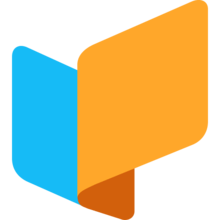Lingua.ly
 Lingua.ly logo | |
Type of site | Online education |
|---|---|
| Available in | |
| Slogan(s) | A brand new way to learn a language. |
| Website |
lingua |
| Registration | Free |
| Current status | Public |
Lingua.ly is an EdTech startup that takes a digital language immersion approach to teaching languages. The company was founded by Jan Ihmels and Orly Furhman, two academics from Cambridge and Stanford respectively. Lingua.ly operates under the freemium business model and exists as a Cloud-based web app and mobile app available for Android and iOS.
Launch
After its beta launch in August 2013, the company's extension for Google Chrome saw widespread early adoption in the US, Spain, and Latin America as a spaced repetition vocabulary acquisition tool.[1] Several publications have recommended Lingua.ly as a free platform for language learning.[2][3][4][5]
In April 2014 Lingua.ly launched its mobile app for Android,[6] achieving 100K downloads in its first month on the Google Play Store. Lingua.ly released a stand-alone web app in June 2014, which was met with largely positive reviews, including coverage in the New York Times.[7][8][9] Most recently, Lingua.ly released an iOS mobile app in July 2014, which was quickly listed as one of the top iPhone apps of the week.[10]
In February 2014 the company won the regional 1776 Challenge Cup's Innovation in Education Award for its patent pending algorithm and language learning platform.[11] In May 2014 Lingua.ly was selected as one of eight global finalists for the Challenge Cup.[12]
Approach
While traditional language immersion entails a target language rich environment where the user is exposed to ample linguistic input from various sources, Lingua.ly utilizes digital language immersion, a method of employing a virtual learning environment to simulate the language learning environment. Users are exposed to authentic input in their target language through their computer, tablet, or mobile device as opposed to lesson-based instruction. Duolingo and Bliu Bliu are other examples of language education tech startups that also partially rely on a digital language immersion approach.[13] In classroom learning, language immersion is often used to teach children in bilingual or content and language integrated learning programs. Digital language immersion is the E-learning extension of these trends.
Lingua.ly relies on a number of applied linguistics principles, including the Natural Approach and Krashen's Input Hypothesis, which argues that fluent language learners benefit most from language they acquire through exposure rather than direct instruction.[14]
Technology and platform
Lingua.ly's platform contains an online and mobile dictionary powered by Babylon that learners can use to look up words from the web in their target language. Through a learner's collected words and click-patterns, the technology maps an individual's vocabulary in the target language.[15] It then rates the suitability of online content suggestions in the target language in order to create an environment for language acquisition based on a 90:10 percentage of known to unknown words.[16] Users customize vocabulary flashcards with images, audio, and example sentences and practice them at spaced repetition intervals to enhance acquisition and transfer into long-term memory.[17]
EdTech for languages
Lingua.ly is part of a growing trend of digital language education startups including, Memrise, Busuu, Babbel and Duolingo that are attracting significant investment funding and unseating former industry leader Rosetta Stone.[18]
See also
- Language education
- Language pedagogy
- Computer-assisted language learning
- List of Language Self-Study Programs
References
- ↑ Lardinois, Frederic. "Lingua.ly Transforms The Web Into A Language-Learning Opportunity". TechCrunch. Retrieved 5 June 2014.
- ↑ Sema, Alexandra. "Opciones para aprender y practicar idiomas". LaPatria.com. La Patria. Retrieved 5 June 2014.
- ↑ "Seis opciones online para aprender y practicar inglés". El Universal. El Universal. Retrieved 5 June 2014.
- ↑ Méndez, Manuel Ángel. "Aprende idiomas mientras lees en Internet con esta aplicación". Gizmodo en Español. Gizmodo. Retrieved 5 June 2014.
- ↑ "Opciones para aprender y practicar idiomas". Vanguardia.com. Galvis Ramirez & Cia. Retrieved 10 June 2014.
- ↑ Sawers, Paul. "12 of the best new Android apps launched in April". TheNextWeb.com. The Next Web. Retrieved 8 June 2014.
- ↑ Hong, Kaylene. "Lingua.ly, which helps you learn new languages by browsing the Web, is now available as a Web app". TheNextWeb. The Next Web, Inc. Retrieved 10 June 2014.
- ↑ Powers, Brian. "Lingua.ly: New Language Learning Web App". Languages Around the Globe. Retrieved 18 June 2014.
- ↑ Rosenbloom, Stephanie. "Inventive, Cheaper Tools for Learning a Language". NYTimes.com. The New York Times Company. Retrieved 22 July 2014.
- ↑ Dredge, Stuart. "20 best iPhone and iPad apps this week". TheGuardian.com. Guardian News and Media. Retrieved 22 July 2014.
- ↑ Rayford, Meg. "Lingua.ly, Winflex, MediSafe Project, and Pink Park Win the Tel Aviv Challenge Cup". Tech Cocktail. Tech Cocktail LLC. Retrieved 8 June 2014.
- ↑ Barba, Ronald. "Startups Win Big as 1776′s Challenge Cup Competition Comes to an End". Tech Cocktail. Tech Cocktail LLC. Retrieved 8 June 2014.
- ↑ Cicerchia, Meredith. "Digital immersion creates wave of change in language education". SmartBlog on Education. SmartBrief. Retrieved 5 June 2014.
- ↑ Krashen, Stephen (2003). Explorations in Language Acquisition and Use. Portsmouth: Heinemann.
- ↑ "Other online language learning sites and apps and how to make the most of them!". GamesForLanguage. GamesForLanguage. Retrieved 10 June 2014.
- ↑ Tanwani, Manika. "A blue friendly creature can teach you a new language!". e27. e27. Retrieved 8 June 2014.
- ↑ "Jan Ihmels, Lingua.ly". ITSAAPP.com. ITSAAPP.com. Retrieved 5 June 2014.
- ↑ "Disrupting Rosetta Stone? A Look at App Store Data for VC-Backed Mobile Language Learning Apps". CBInsights.com. CB Insights. Retrieved 5 June 2014.